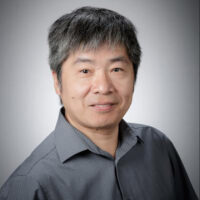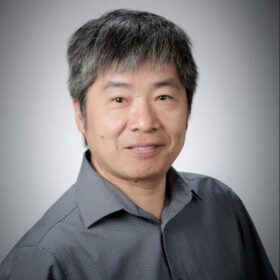Expertise
Areas of Specialization
Research Clusters
Current status
-
Accepting graduate students
-
Professor
Electrical & Computer Engineering
-
Professor
Electrical & Computer Engineering
Overview
Dr. Li has been working on the design, computer-aided modelling and simulation, processing, characterization and packaging of waveguide-based optoelectronic and photonic devices, such as semiconductor laser diodes, semiconductor optical amplifiers, super-luminescent light-emitting diodes, optical modulators, photo-detectors, wavelength division multiplexers, optical beam splitters, optical switch fabric, polarization controlled optical components, and the monolithic integration of these components. The application of these devices is mainly on fiber-optic communication systems and networks. Dr. Li is also actively exploring nanostructures such as photonic crystals and surface plasmonic polariton waveguides for advanced photonic devices, metamaterial and photonic topological structures for slow-wave propagation, unidirectional wave propagation, and optical cloaking, and randomly distributed nanostructures for super-resolution imaging and optical image transmission.
Xun Li received the B.S. degree from Shandong University, Jinan, China, the M.S. degree from the Wuhan Research Institute of Posts Telecommunications, Wuhan, China, and the Ph.D. degree from Beijing Jiaotong University, Beijing, China, in 1982, 1984, and 1988, respectively. From 1988 to 1993, he joined the faculty of the Institute of Lightwave Technology, Beijing Jiaotong University, where he was an associate professor. From 1993 to 1999, he was a research assistant professor with the Department of Electrical and Computer Engineering, University of Waterloo, Waterloo, ON, Canada. In 1999, he joined the Department of Electrical and Computer Engineering, McMaster University, Hamilton, ON, where he is currently a professor.
Xun Li has been working on the design, modeling, fabrication, packaging, testing and characterization, and reliability analysis of III-V compound semiconductor material-based optoelectronic devices, including semiconductor lasers, optical amplifiers, super-luminescent light emitting diodes, electro-absorption modulators, photo-detectors, and their integrations, and various passive photonic devices, including beam splitters/combiners, wavelength multiplexers/demultiplexers, optical filters, optical polarization controlled components, and their integrations. While working in China (1985-1993), Xun Li won many awards for his achievement on the development of dynamic single longitudinal mode semiconductor lasers, including the first place Science and Technology Advancement Prize issued by the Ministry of Posts and Telecommunications of Chinese National Government in 1987 and 1988, respectively. Xun Li co-founded Apollo Photonics, Inc. and developed one of the company’s major software products “Advanced Laser Diode Simulator.” Xun Li authored and coauthored close to 200 peer-reviewed journal papers and over 100 conference papers. He is also the author of a few book chapters on semiconductor DFB lasers and the book “Optoelectronic Devices: Design, Modeling, and Simulation”. He gave over 20 invited talks at international conferences and holds over 30 patents in China, the USA, and the EU. He is among the top 2% most cited scientists by Stanford University. Xun Li provided technical consultation service or worked as a technical consultant for over 20 companies in the photonics industry. Xun Li is an adjunct Professor with Huazhong University of Science and Technology, Beijing Jiaotong University, Minzu University, and Shandong University, China.
Dr. Li is a senior member of IEEE and Optica, and a member of SPIE. He is a licensed professional engineer of Ontario, Canada.
B. Sc. (Shandong University, China); M. A. Sc. (Wuhan Research Institute of Posts and Telecommunications, China); Ph. D. (Beijing Jiaotong University, China)
Dean’s Teaching Honour Roll (ElecEng 4OI6)








